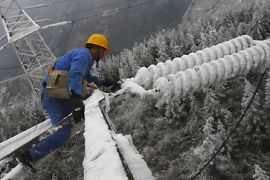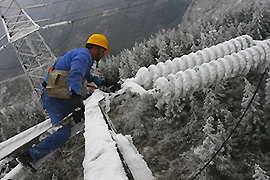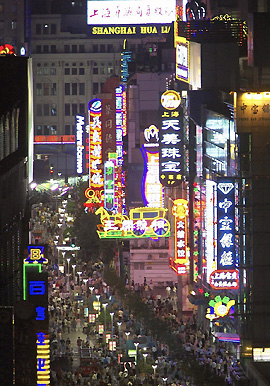Winter saps China energy supplies
Country faces worst-ever power shortage as coal supplies fall to critical levels.

 |
| Bitter winter weather has drained China’s energy supplies to critical levels [GALLO/GETTY] |
China is facing its worst-ever power shortage as winter weather puts pressure on dwindling coal supplies.
Keep reading
list of 4 itemsAfter the Hurricane
World’s coral reefs face global bleaching crisis
Why is Germany maintaining economic ties with China?
Officials say reserves are down to emergency levels with only enough coal to power the entire country for another eight days.
According to state media the shortage amounts to nearly 70 gigawatts, equivalent to about the entire generating capacity of the United Kingdom.
Across China 13 provinces including the southern industrial and export hub of Guangdong, have already begun rationing supplies, tiggering brown-outs across large areas.
 |
| China’s energy infrastructure is struggling to keep up [GALLO/GETTY] |
Coal provides 78 per cent of China‘s energy needs, and the country is the world’s biggest producer and consumer of coal.
In recent years the soaring demand for coal energy and the potential profits available has driven many mine owners to reopen illegal or unsafe mines, making China’s mining industry the deadliest in the world.
In response the government has launched a series of crackdowns, closing mines across the country that fail to conform to basic safety standards and putting a further squeeze on supplies.
But the demand for coal remains insatiable.
As China’s economy surges ahead and its population gets richer – buying more fridges, heaters, air conditioners and other consumer electronics – the country’s energy infrastructure is struggling to keep up.
Already, according to some estimates, China is opening an average of one new coal-fired power station a week.
But with snow currently blanketing large areas of the country and temperatures plummeting, the power stations are stretched to the limit.
 |
| China’s booming economy is demanding more and more power [EPA] |
While some are struggling to secure increasingly costly coal, other plant operators are shutting down capacity rather than sell power at a loss.
That in turn is causing a worry for the Chinese government which does not want to fuel already alarming inflation levels by allowing suppliers to charge higher prices for energy.
Analysts say the problem largely stems from Beijing‘s attempts to control inflation and avoid social unrest by controlling the price of some types of energy, like power, while allowing others like coal to be liberalised.
That has been further compounded by the winter snows which are hampering transportation of coal supplies from the coal producing areas to the power plants.
With the government unlikely to lift caps on electricity prices any time soon, the impact of the coal shortage could spread to other markets.
In summer 2004, during China‘s biggest previous power shortage, a rush for individual generators and diesel to run them helped push up international oil prices.
For this year in Shanghai officials in China‘s largest city have budgeted $2.5bn to keep the power running through the rest of the year.
They are already bracing themselves for the summer when summer temperatures soar, city residents turn on their air conditioners and whole cycle will likely repeat itself.
But Al Jazeera’s correspondent Melissa Chan says that is a luxury that dozens of poorer, smaller cities in China simply do not have.
Instead they are facing the possibility of blackouts because, when the rich, eastern, coastal cities are threatened with shortages, they dip into the power supplies of the outer provinces.
And that threatens to leave many living in the countryside in the dark.